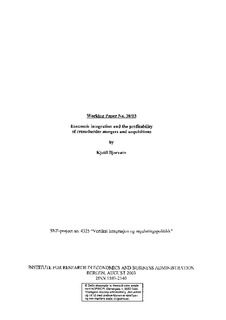| dc.contributor.author | Bjorvatn, Kjetil | |
| dc.date.accessioned | 2006-06-27T10:35:11Z | |
| dc.date.available | 2006-06-27T10:35:11Z | |
| dc.date.issued | 2003-08 | |
| dc.identifier.issn | 1503-2140 | |
| dc.identifier.uri | http://hdl.handle.net/11250/165614 | |
| dc.description.abstract | The 1990s was a decade of increased economic integration. The decade also witnessed a sharp increase in cross-border mergers and acquisitions (M&As). From a theoretical perspective, the increase in M&As in more integrated economies is rather puzzling. It is a well-established result that due to the “business stealing effect”, mergers in integrated markets are not likely to take place. A reasonable conjecture would therefore be that closer integration of markets would reduce the profitability of mergers. The present paper demonstrates that economic integration may trigger cross-border acquisitions by reducing the business stealing effect and by reducing the acquisition price of the target firm. The paper thus provides explanations to the rather puzzling observation of increased cross-border mergers in more integrated economies. JEL classification: F15, F21, F23, L12, L13 Keywords: Economic integration; Mergers and acquisitions; Trade; Foreign direct investment; | en |
| dc.format.extent | 1689183 bytes | |
| dc.format.mimetype | application/pdf | |
| dc.language.iso | eng | en |
| dc.publisher | SNF | en |
| dc.relation.ispartofseries | Working paper | en |
| dc.relation.ispartofseries | 2003:30 | en |
| dc.subject | economic integration | en |
| dc.subject | mergers and acquisitions | en |
| dc.subject | trade | en |
| dc.subject | foreign direct investment | en |
| dc.title | Economic integration and the profitability of cross-border mergers and acquisitions | en |
| dc.type | Working paper | en |
